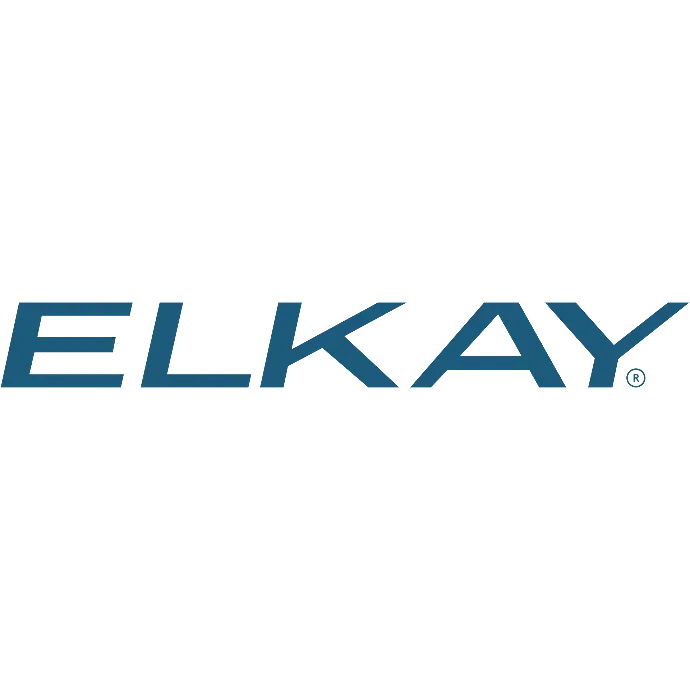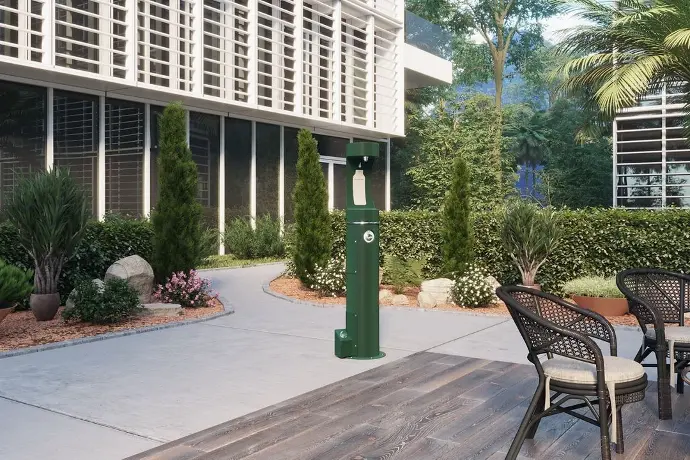Sustainability for the Hospitality Industry
A single 200-room four-star hotel can use nearly 300,000 pieces of single plastic in a month underscoring the hospitality industry’s challenge as it gears up anti-plastic efforts.
The estimate includes 20,000 plastic water bottles, 49,765 plastic amenities and amenity packages, 216,693 pieces of plastic for food and beverage operations, including plastic wrap, storage bags and latex gloves, and 13,375 plastic bags, which does not even include plastic laundry bags used by third-party services to protect laundered clothing for staff and guests, and bags used by food suppliers, said sustainability and plastics expert Marissa Jablonski.


In August 2019, the Marriott group announced that it will replace most of its hotels’ single-use shampoo, conditioner and bath gel bottles with larger ones by 2020, preventing about 500 million of the tiny plastic bottles from reaching landfills yearly—equivalent to about 770 tonnes of plastic annually and 30 percent of its current plastic use for amenities. Plastic straws and stirrers are also out, averting the disposal of one billion straws per year.
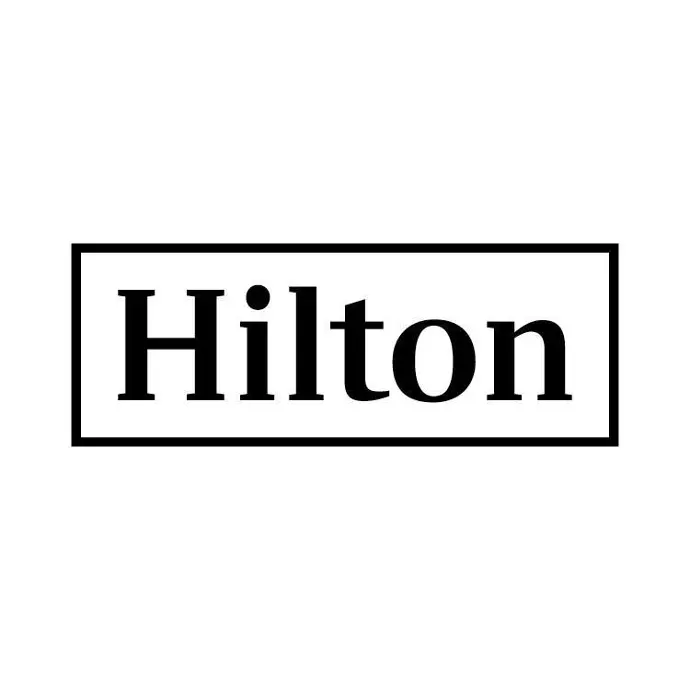
The Hilton Hotel has removed plastic straws from its hotel operations, saving over 250 million straws annually; switched from plastic key cards to digital ones at a number of hotels, staving off 40 tonnes of plastic waste so far; and eliminated plastic water bottles from meetings and events at hotels it manages in the Asia Pacific, Europe, Middle East and Africa.
It is also cutting back on single-use miniature toiletry bottles and seeking alternatives to plastic wrap for its food and beverage operations, among other actions. “We’re highly aware of the environmental damage that single-use plastic can cause, and take the global issue of plastic pollution very seriously”, said Paul Hutton, Hilton’s vice president of operations in Southeast Asia and executive sponsor of its plastics working group in Asia Pacific.
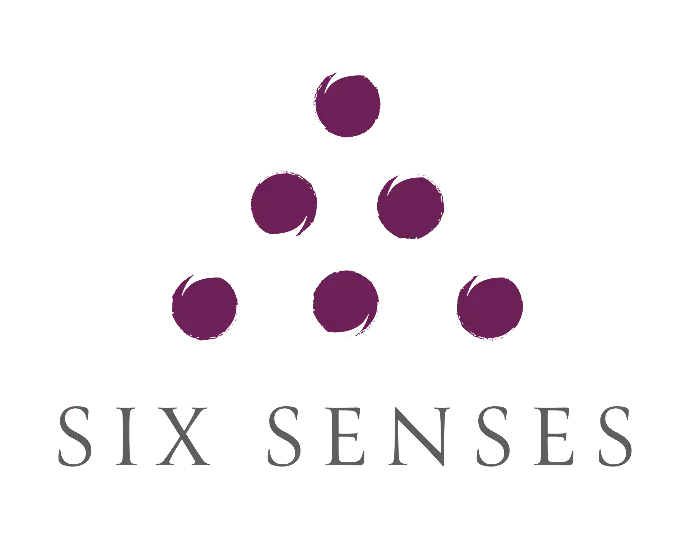
The Six Senses group, which operates hotels, spas and resorts globally, has cut out plastic straws and disposable food and beverage containers, and uses glass water bottles instead of plastic ones. It also uses refillable dispensers for shampoo, conditioner and shower gel, and recycles or reuses coffee pods. Some properties also provide loose tea in paper pouches instead of tea bags, which traditionally contain plastic, among other measures.
Chew Siew Moon, Six Senses’ Sustainability Manager for its Singapore hotels, added that several of the group’s other properties offer guests non-plastic slippers that are washed in-house and reused, but the Singapore ones have not done so because of lack of space to install on-site washing infrastructure, and local laundry services refusing to handle slippers.
Silicon covers to replace plastic cling wrap for containers that do not have air-tight lids were also trialled in the hotels’ kitchens, but were too fragile. “We need to find a vendor who can work with us to reuse slippers, and industry needs to come up with workable solutions for some of the plastic use”, said Chew.
WATER WITHOUT WASTE
Eliminating plastic bottles, one of the biggest sources of plastic use in hotels, comes with its own challenges.
At the Six Senses Singapore hotels, staff refill the glass bottles and clean up the mess when guests break them. “This is additional work for them that they are not used to. We have to make it clear to them at the interview stage that it is part of the job scope, and provide training”, said Chew.
Other hotels have taken a different approach by installing water bottle filling stations for guests to use. The US-based firm Elkay, which started selling such units in the 1980s in addition to its drinking fountains and water coolers, has supplied the Hilton group, Headland Hotel in Hong Kong, and the recently launched Hard Rock Hotel Desaru Coast in Malaysia.
The Elkay stations have several features that make them suitable for hotels, said a spokesperson. These include touchless sensor activation, a fast flow rate that can fill a 610 ml. bottle in 10 seconds to minimise queues even during peak hours, and a mechanism that cuts off water flow after 20 seconds to prevent wastage.
Elkay Drinking Solutions
Refill water bottle and reduce the use of plastic bottled water
“Each station also has a ticker that displays how many PET water bottles have been saved through its usage. This tally can be an important part of a hotel’s sustainability story. At the Hilton San Francisco Union Square hotel, our water bottle filling stations helped it to avoid using 200,000 plastic PET water bottles within 10 months”, said Elkay's spokesperson
She noted that some hotels in Asia may be reluctant to install water bottle filling stations due to the poor quality of the local municipal water or customers’ longstanding distrust of public drinking and bottle filling stations. “In these cases, we provide point-of-use filtration systems that have anti-bacteria or active carbon filters, or both. The units’ status monitor also assures guests that they are drinking clean, filtered water”, she said.
Hotels can also install freestanding versions of the bottle filling station and customise them with artwork and messages to further encourage guests to reduce waste. “Since 2010, our bottle filling stations have saved about 7 billion plastic water bottles from going into landfills, enough bottles to circle the globe 112 times”, said the spokesperson.
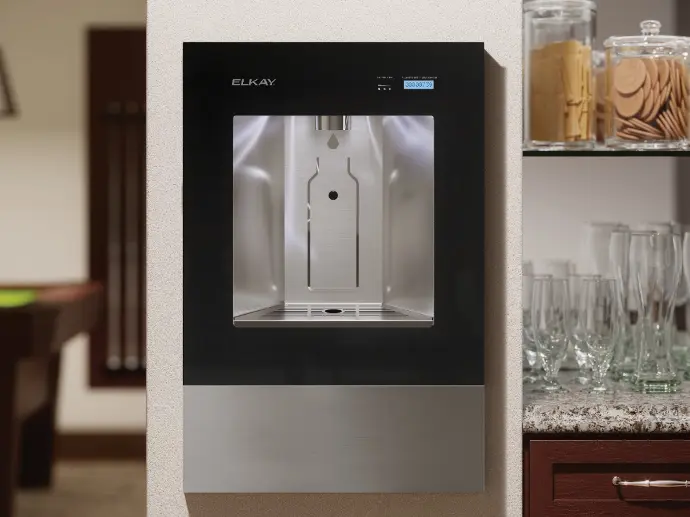

Did you know that...
Bottles take large amounts of space in garbage landfills
Even if you crush plastic bottles it will take an average of 1,000 years to biodegrade.
25% of water in your bottle is the is the same amount of fuel it took to produce that bottle.
Bottles often end up at the bottom of the ocean and in the bellies of many animals that confuse them with food
The process to manufacture plastic bottles requires over two gallons of regular water to produce every gallon of purified water
Plastic bottles are made of Polythylene Terephthate (PET) and also contain Bisphenol A (BPA), a chemical used to make plastic hard and transparent
Elkay Drinking Solutions
Built for high-traffic hallways, fitness centers or patio areas, our trusted drinking solutions give guests and staff access to cleaner, healthier water. Our filters are NSF certified to reduce lead, chlorine and other contaminants
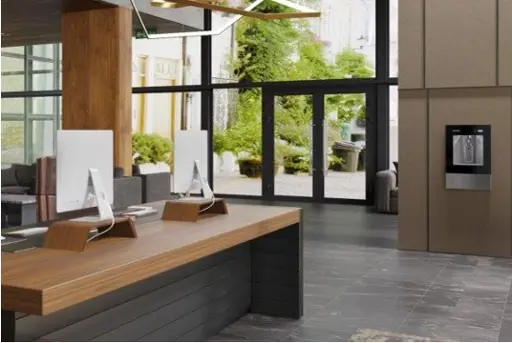
In-Wall
ezH2O Liv® Pro. In-wall Filtered Water Dispenser.
Serve guests and colleagues cleaner, healthier water in a sustainable way with an Elkay ezH2O Liv Pro This hands-free water dispenser is designed for commercial and hospitality environments such as lobbies and conference rooms. Say goodbye to ordering expensive cases of bottled water that take up precious storage space.
Products for Every Project
From bottle filling stations to water coolers and fountains, our filtered and vandal-resistant drinking water products offer the ultimate solution for your hospitality environment.

Contact Us
Please let us know if you are interested in sustainability for your hotel.
